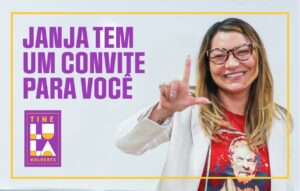The origins of Lula Institute date back to the early 1990’s, when the Citizenship Institute began to take form. Learn how we got where we are now.
Throughout its history, the Citizenship Institute has gone through several stages, following the political career of Luiz Inacio Lula da Silva until he reached the presidency.
The Institute had its origins in the so-called Parallel Government, which was created under Lula’s leadership after his defeat in the 1989 elections, and between 1990 and 1992 offered critical alternatives to the public policies of the Fernando Collor de Mello government. In this first stage, the Institute provided structural and legal support for the Parallel Government.
Later came the Citizenship Caravans and public discussions, activities, studies, research, information and public policies in depth were prepared, always taking care to assure a pluralistic focus approach that marks a nonpartisan institution.
In 2005, the Institute began to scale down its activities. With the end of President Lula’s second mandate in 2011, it became the place where he prepared the creation of the Lula Institute.
It was at the Institute that Lula matured his ideas and his projects and engaged in the practice of democratic dialogue with society for the development of public policies. And today it is where he is structuring the organization where he will carry on his work after eight years as president of Brazil.
The beginning: the Parallel Government (1990-1992)
Inspired by the British experience, the Parallel Government was formed as a means of political action with the exercise of a qualified opposition to the recently elected Collor Government. The goal was to maintain the connections between the political forces that coalesced around Lula’s candidacy for the second round of the 1989 election and carry out democratic monitoring of the new administration.
The Parallel Government prepared proposals for strategic alliances resulting in intense discussions involving various diverse social actors coordinated by leaders from culture, science and social democratic popular opposition, such as Antonio Candido, José Gomes da Silva and Aziz Ab’Saber, among many others.
After the impeachment of President Collor, when the reasons that led to the creation of the Parallel Government began to subside, the Citizenship Institute became a place for discussion and drafting of public policy proposals. In the following years, seminars were held to present an analysis of the political and economic situation and the discussion of specific issues such as drought, combating corruption, industrial development and the others.
The Citizenship Caravans (1993-1996)
Between 1993 and 1996, the Citizenship Institute helped to organize the Citizenship Caravans, an experience that was virtually unknown in Brazilian political tradition. A team of political and labor leaders, and technicians and specialists, joined Luiz Inacio Lula da Silva in five Caravans that visited a total of 359 cities in 26 states, with the objective of deepening the awareness of the present reality, listening to forgotten communities, sharing positive experiences and articulating viable proposals for the development of these areas. This contact with the reality of the entire country was a great learning experience for Brazil, and was an essential part of the experience of the future president, Luiz Inacio Lula da Silva.
The first caravan left Garanhuns (PE), where Lula was born, and ended in Vicente de Carvalho, a poor district of Guaruja (SP), to which his family had migrated in 1952.
A virtually unprecedented experience in Brazilian politics, the Caravans were an innovative way to contribute to awareness and the spread of citizenship rights of millions of inhabitants deep in the heart of Brazil.
Later, in 2001, three new caravans traveled seven states and 47 cities.
Two books and a video report an important part of the knowledge acquired during these journeys – Viagem ao Coração do Brasil (Journey to the Heart of Brazil) published by Scritta with a video prepared by TV dos Trabalhadores (Workers’ TV) and Diário de Viagem ao Brasil Esquecido (A Diary of a Journey to Forgotten Brazil) (also published by Scritta).
Projects (1999-2002)
In 1999, the Citizenship Institute began to intensify its activities. In addition to seminars and debates the Institute went on to work with extensive issue-oriented projects that resulted in more accurate analyses and comprehensive proposals for public policy. These projects involved the interaction of diverse political actors and experts in each area in a bipartisan environment. Among the issues discussed were as housing, electricity, public safety, political reform, nutritional security and youth-related issues.
By 2002, the Citizenship Institute had a staff of economists and sectoral working groups that performed analyses of the national economic and political situation, as well as a communications team, responsible for press relations and publications.
See the projects undertaken by the Citizenship Institute.
When taking office, president Luiz Inacio Lula da Silva assigned the responsibility for directing the Institute to businessman Jose Alberto de Camargo
The Institute continued to work on the issues, projects, seminars and debates, often in partnership with other institutions. In 2003 and 2004, the Institute created and carried out the Projeto Juventude (The Youth Project), a comprehensive analysis and a set of proposals for public policy focused on Brazilian youth.
The Citizenship Institute also monitored the development of various government policies and projects that it created. The Projeto Moradia (Housing Project) led to the creation of the Ministry of Cities, the National Council of Cities, and housing and sanitation programs. The Projeto Segurança Pública (Public Safety Project) gave rise to the Unified Public Safety Program, under the Ministry of Justice. The Projeto Energia Elétrica (Electric Power Project) provided the basis of the national energy program. The Projeto Reforma Político (Political Reform Project), was submitted to the Special Committee on Political Reform of the Chamber of Deputies, and provided valuable insights on the proposal that is being discussed in the Legislature. The Projeto Fome Zero (Zero Hunger Project) led to a federal program for nutritional security and hunger and is now carried out by various ministries and is a part of the Bolsa Familia (Family Allowance) program.
Between 2003 and 2005, the Citizenship Institute provided support for holding monthly meetings with leading intellectuals to reflect on the overall direction of the country. The group provided critical monitoring of the national situation, evaluated the actions of the government and discussed the role of social movements, the university and the intellectuals themselves in society.


